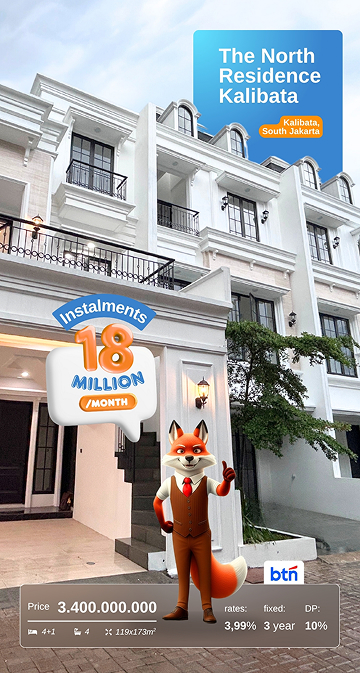For many expatriates living and working in Indonesia, the aspiration to own a home is a natural step toward long-term settlement. However, purchasing the property outright can be financially demanding. One practical solution is applying for a mortgage (Kredit Pemilikan Rumah or KPR), a financing scheme that allows buyers to pay for property in instalments over time.
Mortgage Application Tips: Know What is a Home Loan
A KPR enables you to allocate a portion of your monthly income towards paying for your dream home. For expatriates, this method is increasingly appealing, offering a manageable way to enter the property market in Indonesia.
With a mortgage, you can set aside some money each month to pay for your dream home. There's no denying that this method is very attractive to expats living in Indonesia.
When applying for a mortgage from a lending bank, there are, of course, processes and requirements that the buyer must go through. Honestly, this approval process can be quite anxiety-inducing. Especially since there’s a lot of talk going around about how difficult it can be to get approved by the bank.
Understanding the steps, eligibility requirements, and how to present a strong application can significantly improve your chances.
Here is a comprehensive guide to passing a bank appraisal for a mortgage in Indonesia, tailored specifically for expatriates.
Mortgage Requirements for Foreigners in Indonesia
In Indonesia, there are two types of mortgages: subsidised and non-subsidised. Foreign nationals are only eligible for non-subsidised mortgages, which can be applied for by individuals or business entities. The key requirements include:
1. A Valid KITAS
Foreign nationals must hold a Limited Stay Permit Card (KITAS) as legal identification. According to Government Regulation No. 103, this document is mandatory for foreigners intending to purchase property in Indonesia.
The Limited Stay Permit Card (KITAS) allows foreign nationals to stay in Indonesia for a longer period of time, either to work or marry an Indonesian citizen.
2. A Right to Use Certificate (Hak Pakai)
Unlike Indonesian citizens who receive a Certificate of Ownership (SHM), foreigners must obtain a Right to Use Certificate. This allows expatriates to legally use the property for a specific term, typically 20, 30, or up to 80 years.
3. Minimum Property Price
Foreign ownership is also subject to a minimum property price threshold. This varies by location.
For example, the minimum price is IDR 5 billion in Jakarta and Bali, and IDR 2 billion in North Sumatra.
Steps to Apply for a Mortgage in Indonesia
To begin the process, follow these structured steps:
1. Choose the Property
Decide on the type of property you wish to purchase, new or second-hand, either from a developer or an individual seller.
Ensure that the selected property qualifies for mortgage financing and is in a secure, accessible area.
2. Review Property Specifications
Research the property thoroughly, including its pricing, down payment requirement, payment structure, and any associated maintenance or environmental fees.
3. Pay the Booking Fee
A booking fee secures your intent to purchase the property. This is generally non-refundable and serves as a preliminary commitment.
4. Prepare Required Documents
Gather all necessary documents, which typically include personal identification (KITAS, passport), proof of income (pay slips, tax returns), and documents related to the property (ownership certificates, valuation reports).
5. Submit Your Application
File the complete application with a bank that offers mortgage schemes to expatriates. Each bank may have its own specific terms and interest rates, so it is advisable to compare options beforehand.
Tips Terbaik untuk Memastikan Pengajuan KPR Anda Disetujui
Here are practical tips to help your application succeed during the bank appraisal process:
1. Maintain a Clean Credit History
Your credit record plays a significant role. Any overdue payments, defaults, or negative marks in your BI Checking (now SLIK OJK) report can result in immediate rejection. Resolve any outstanding issues before applying.
2. Demonstrate Income Stability
Banks prefer applicants with a stable source of income. Ideally, you should have worked with the same employer for at least two years, or have an established business. Your monthly mortgage payments should not exceed 30 to 40 per cent of your income.
3. Prepare an Adequate Down Payment
The larger the down payment, typically 10 to 30 per cent of the property price the better. A substantial down payment reflects financial responsibility and reduces the loan burden.
4. Submit Complete and Accurate Documents
Make sure your documentation is comprehensive and free from errors. Incomplete or inconsistent paperwork can delay or derail the appraisal process.
5. Select a Property Within Your Budget
Banks evaluate whether your income can realistically support the mortgage. Use online simulations to calculate monthly repayments and ensure the loan is affordable.
6. Avoid New Debt Before Applying
Refrain from taking out new loans or credit cards before applying for a mortgage. An increased debt-to-income ratio can make lenders wary and affect your application.
7. Compare Bank Offers
Different banks offer different mortgage products. Look for competitive interest rates, flexible repayment tenures, and options that align with your financial profile.
Use a Mortgage Consultant with Lets Move Group
Navigating Indonesia’s mortgage landscape as an expatriate can be complex, particularly when dealing with unfamiliar legal frameworks and language barriers. That is where professional assistance becomes invaluable. Engaging a mortgage consultant ensures you are guided through each stage, reducing the risk of error and improving your chances of approval.
Lets Move Group is a reputable property and relocation service provider specialising in helping expatriates settle in Indonesia. Their team of mortgage consultants understands both local regulations and the unique needs of foreign buyers. Whether you are applying for your first mortgage or seeking refinancing options, Lets Move Group provides tailored advice, assists with document preparation, and liaises directly with banks on your behalf.
For expats unsure where to begin, working with an experienced mortgage consultant like Lets Move Group not only simplifies the process but also boosts confidence in securing the right mortgage product for your needs.














